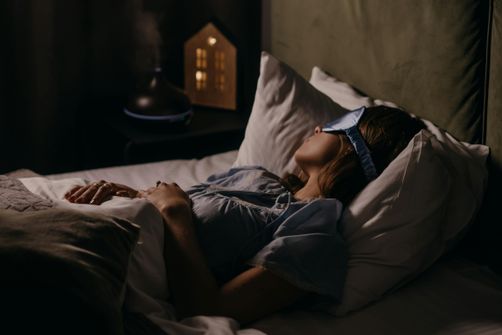
How CBT-I Helps Women Manage Insomnia: Boosting Sleep Quality and Overcoming Sleep Disorders
Sleep is essential for physical and mental well-being, but many women struggle with sleep disorders like insomnia, which can lead to fatigue, irritabi...

Laughter is a powerful tool for improving both mental and physical health, especially for women. The act of laughing releases a cascade of positive physiological and psychological responses, promoting emotional resilience, enhancing immune function, and even reducing pain perception. In a world where stress, anxiety, and societal pressures affect women disproportionately, fostering a sense of humor can be a significant tool for maintaining well-being.
Let’s dive into the science behind laughter and its unique impact on women’s health.

When we laugh, a series of changes occur in our body that can benefit both short- and long-term health:
Beyond the physical effects, laughter is a mental health powerhouse. Women, who often juggle multiple roles and face unique societal pressures, can greatly benefit from the stress-relieving effects of humor.
Laughter provides an immediate stress release. It’s like an emotional reset button that helps clear tension and anxiety. In fact, laughter decreases cortisol and other stress-related hormones, making it an effective tool for dealing with daily challenges.
Women often face a greater emotional load, balancing career, family, and social expectations. Laughter can build emotional resilience, helping women bounce back from life’s challenges. Humor fosters a positive outlook and helps reframe negative experiences in a more manageable way.
Laughter is social glue. Sharing humor and laughing with others strengthens relationships, whether with friends, family, or colleagues. Positive social interactions are critical for mental health, and women who engage in these lighthearted moments often experience greater emotional support and a stronger sense of connection.
Chronic pain is a common issue for many women, especially as they age or deal with conditions such as arthritis or fibromyalgia. Laughter can be a valuable tool for managing pain.

As women age, maintaining cognitive function becomes increasingly important. Laughter and humor have been shown to enhance cognitive flexibility, improve problem-solving skills, and support memory.
Laughter stimulates multiple areas of the brain, improving cognitive flexibility—the ability to think about multiple concepts simultaneously or switch between different ideas easily. This type of mental agility can delay cognitive decline and foster creativity.
Laughter also boosts memory. The act of laughing increases dopamine, a neurotransmitter that plays a key role in learning and memory. For older women, maintaining cognitive health through humor may help delay the onset of age-related memory decline.
To harness the health benefits of laughter, women can incorporate humor into their daily lives through simple, enjoyable activities:
Q: How does laughter affect physical health?
A: Laughter triggers the release of endorphins, the body’s natural feel-good chemicals, which act as painkillers and improve mood. It also reduces levels of cortisol, the stress hormone, and can help improve immune function by boosting antibody production. Additionally, laughter enhances Heart Health by improving blood circulation and relaxing blood vessels.
Q: Can laughter really help with stress and anxiety?
A: Yes, laughter is a powerful stress reliever. It reduces cortisol levels, which helps lower stress and anxiety. Research has shown that individuals who laugh more frequently experience lower stress levels and are better able to cope with daily challenges, improving overall emotional resilience.
Q: How does humor improve mental health in women?
A: Humor provides a healthy outlet for processing emotions, reducing anxiety, and enhancing emotional resilience. It promotes a positive outlook, strengthens social bonds, and can prevent emotional burnout, especially for women who juggle multiple roles. Laughter has also been linked to better cognitive function and mental clarity.
Q: Can laughter really reduce pain?
A: Yes, laughter stimulates the release of endorphins, which act as natural painkillers, temporarily reducing the sensation of pain. It also provides a distraction from pain, helping people cope better with chronic pain conditions like arthritis or fibromyalgia.
Q: Does laughing have long-term benefits for brain health?
A: Absolutely. Regular laughter can improve cognitive flexibility, creativity, and memory. Studies suggest that laughter stimulates areas of the brain that are critical for problem-solving and memory, which can help delay cognitive decline as women age.
Q: How can I add more laughter into my daily life?
A: There are many ways to incorporate laughter into your daily routine. Try watching comedy shows or movies, spending time with funny friends, attending a laughter yoga class, or even keeping a humor journal to capture amusing moments from your day.
The information provided in this article is for general informational purposes only and should not be considered as professional medical advice. Always consult a healthcare provider before making any changes to your health routines, especially if you are managing conditions related to stress, pain, or mental health. Individual results may vary, and laughter, while beneficial, should not replace professional treatment or therapies for chronic health conditions.
The science is clear—laughter is a powerful tool for promoting both physical and mental health in women. From reducing stress to improving cognitive function, fostering a sense of humor can lead to a longer, healthier, and more fulfilling life. In a world that often feels overwhelming, a good laugh might just be the best medicine for enhancing emotional resilience and well-being.
Start Today: Seek out humor in your daily life, whether it’s through comedy, socializing, or simply finding joy in everyday moments. Your body—and mind—will thank you!

Sleep is essential for physical and mental well-being, but many women struggle with sleep disorders like insomnia, which can lead to fatigue, irritabi...

Friendship isn't just about shared laughs, deep conversations, and happy memories—it's also about longevity. Female friendships play a crucial role in...

Liminal spaces, or transitional periods in life, represent moments of transformation where women are “in between”—neither in the old nor the new, but ...

Creative Expression, whether through art, music, writing, or other pursuits, is not just a source of joy and self-expression—it has profound impacts o...

Menopause often brings significant changes to a woman’s sleep patterns, affecting not just her rest but also cognitive health. insomnia and brain fog ...